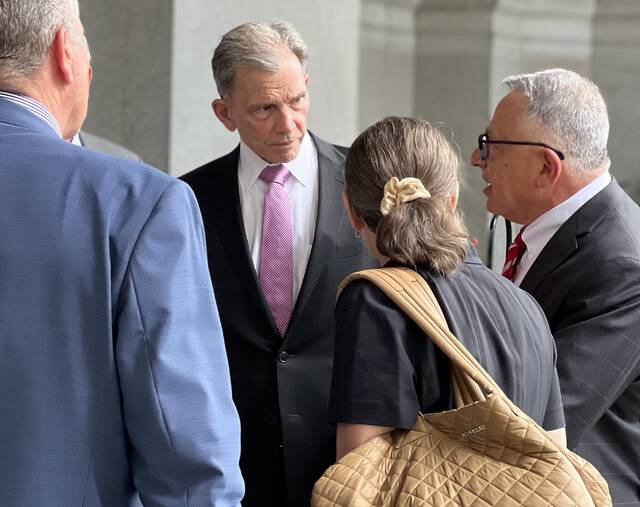A surreptitious recording of a conversation between UPMC’s head of cardiothoracic surgery and the doctor treating him with suboxone was “part of a years-long vendetta,” an attorney for the hospital behemoth said in court on Wednesday.
UPMC attorney John Conti argued during a preliminary injunction hearing that circumstantial evidence in the case shows that the recording was made by Dr. Jonathan D’Cunha and Dr. Lara Schaheen in February 2018.
They made it, Conti told Allegheny County Common Pleas Judge Philip A. Ignelzi, because they were angry at Dr. James Luketich after he accused them of having an improper relationship and of engaging in academic dishonesty.
“Only two people had the motive and opportunity to conduct that recording,” Conti said.
Both D’Cunha and Schaheen have since left UPMC and now practice in Arizona.
The recording is at the center of the injunction hearing, which has spanned several days since the summer and continues this week.
Luketich and UPMC argue that the recording was made in violation of Pennsylvania’s wiretap laws, and they are seeking to have it excluded from being used at trial in an ongoing civil case.
However, attorneys for D’Cunha, Schaheen and patient Bernadette Fedorka, who is suing for medical malpractice, believe the recording is important evidence in the case.
They argued on Wednesday that Luketich and UPMC failed to meet the burden necessary to obtain a preliminary injunction. But Ignelzi denied their motion and said he would allow the hearing to play out.
It will continue Thursday with an audio expert and then testimony by D’Cunha, who filed a federal whistleblower action against Luketich and UPMC in federal court.
That case is still pending.
The recording was made in an observation room adjacent to a surgical suite at UPMC Presbyterian hospital on Feb. 26, 2018.
Although its contents have not been played in open court, the recording captured Luketich talking to Dr. David Wilson, who had treated him with suboxone for years.
At the hearing in August, Luketich testified that he became addicted to prescription narcotics in the 1980s after he suffered a shoulder injury during medical school.
He said that when he realized he was developing a dependency he sought help. Then, in 2008, Luketich said he was prescribed suboxone for pain caused by a slipped disc. Wilson had been treating him for years.
Both Luketich and Wilson testified during the hearing that they believed their conversation in the observation room was private and that they were speaking as doctor and patient.
However, attorneys for Fedorka argued that Pennsylvania’s wiretap laws don’t allow for the filing of an injunction. Instead, the way to properly exclude it would have been for Luketich to file a civil lawsuit.
Further, they believe there should be no expectation of privacy for the recording, which was made in a commonly used room. Patrick Loughren, who represents Fedorka, told the court that U.S. Supreme Court precedent shows that in a situation of public importance, the First Amendment and the need for that information to be revealed trumps the state wiretap law.
Innocent disclosures are not a violation of the law, Loughren said.
However, attorney Efrem Grail, who represents Luketich, disagreed.
“There’s no innocent receiver exception to the wiretap act,” he said. “We think Lara Schaheen and Dr. D’Cunha have the tape, they made the tape, and they provided the content of the tape.”
He also said that he believes that they are the ones that gave it to Fedorka and her attorneys to use in the civil case.
Grail argued that the continued, ongoing disclosures of the transcript of the recording are also violations of Pennsylvania’s wiretap law.
“There is no question there was an expectation of privacy, and that invasion of that is more than enough harm to justify an injunction and prohibit the use of the transcript and its content,” Conti said.
He told Judge Ignelzi that D’Cunha and Schaheen filed complaints about Luketich and his suboxone use with the hospital system and the state medical licensing board in 2018, as well as the federal government in 2019.
“Every one of those bodies found him completely competent to perform surgery, and he’s performed surgery unfettered for these past years,” Conti said.
Also on Wednesday, UPMC’s director of public safety administration testified about the system’s security cameras and door-swipe access.
Jeffrey Francis told the court that while there was a security camera trained at an exterior door outside the room where the recording was made, it does not record inside the room. Further, security camera recordings are recorded over about every 30 days.
Francis said records of card-swipe access to the room are only saved for two years.
Because no one requested the information about the day the recording was made until years later, Francis said there is no card-swipe or camera footage available.








